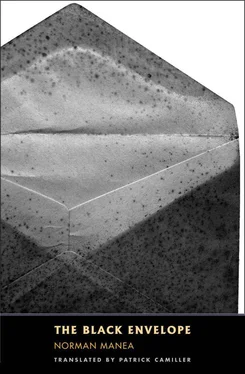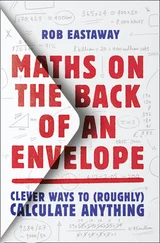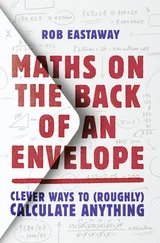“No, I don’t know. And God help you if I did. How does Goody-Goody speak? How does he dare talk like that about … we know who … how does he dare? And you, Vasile, how can you dare to be compared with we know who? Haven’t you any pride left at all, any respect for this poor little country of ours?”
“Yes, that’s what the doctor said. If that one was as healthy as me, we’d be much much much … what shall I say? … um, much happier. But stop shouting like that: it’s not allowed. You know it’s not allowed and it won’t do you any good at all, really.”
“There’s nothing the least bit wrong with me, m’sieur. All I want is to go to that rendezvous of yours. To listen to you all there. To hear what it was like. Because it’s being repeated now, you must know that. You’re a brainy guy, Vasile; you can see that it’s all happening again, can’t you? But let me tell you the truth. You’re the only one I’ll tell it to. And the truth is, I don’t care. I do not care! Not a moment’s thought, that’s me: I haven’t a clue about anything. Everything leaves me cold; it all passes me by. That’s my secret, Bazil, I’m as thick-skinned as they come. Do you hear? Thick-skinned and flighty. That’s my secret.”
And Mr. Tolea seemed disgusted with what he was saying— which meant he was wide awake. He had a sneer when he spoke. He spat out the words, as if they were mere scraps quite unlike what had remained hidden inside.
“Call me Lucky Luke. That’s how you can pamper me, Vasile; I’ll allow you to tonight. In my class they used to shout out, Bolero. They’d make fun of me — bring me down with a crash, you could say. They’d keep blowing up the balloon as far as it went. And when I was about to get into the basket, pshhhh … the gas escaped. Just as I was getting into the balloon, pshhhh … They’d all heap scorn on me — with both their eyes and their mouth, as is the habit in this land of ours.”
He blew his own trumpet, Mr. Tolea did; that’s how he was made. His clothes, his chatter, whims, and stories all served to demonstrate what a great and important guy he was. But he had suddenly realized that if he spat out his words like that — in disgust, with his lower lip turned up — it meant that—
He had suddenly fallen silent. Suddenly silent, and as yellow as a lemon. That’s what he’s like. Once it comes over him, he loses all interest. He has no appetite for anything, as simple as that — there’s nothing to be done about it.
Bonehead Vasile has stopped in the doorway leading from the cloakroom. Stopped there like a dummy. Tolea had sensed it. Without moving and without looking, he had felt that Vasile was no longer nearby on the carpet, that he had sneaked away and was standing over there, a statue, like a dummy.
He wanted to turn and look at him standing with his back to the door: he wanted to swing around and look at him. He didn’t care: Mr. Vancea didn’t care about anything or anyone, and yet he felt like swinging around to look at bonehead Vasile standing stone-still in the frame of the door. To look, bored, at Vasile the dunce. He couldn’t, he couldn’t turn around: he was stricken with paralysis. From fear, the fear of being turned into stone perhaps. The only light still glowing was the tiny one on the cassette player. Tolea could have turned around: there was no danger; he had no reason to be afraid of Vasile. But he was rooted to the spot, unable to budge, even when he heard steps approaching. He did not move — and what solemn steps he suddenly had, that sly, servile schizophrenic. The punishing step of a prosecutor. Like a punitive and unyielding fa-ther — his old dead father — that was how the madman approached.
Vasile had halted behind Tolea, glued to the curved spine of Professor Anatol Dominic Vancea Voinov.
Not even the doors were creaking anymore. The world had stopped breathing. The end: the year 1000. The duffer Anatol Vancea was cowering, as if he had lost all his sap. It lasted a long time, a short time — hard to say. Vasile sneaked away, giving himself airs in front of Mr. Tolea. The professor was pale in the face, with bulging eyes that saw nothing whatsoever. Mr. Tolea did not even have the strength to look, to whine, to lift his hands in front of his eyes and drive away the apparition. He did nothing; he just looked at great Bazil. Deathly pale, but conscious. He wasn’t drunk: he had the same mocking expression on his face that he always wore. But he was white as a sheet. Poor Tolea looked with babyish eyes, without blinking and without seeing.
Vasile was dressed in the doctor’s brown raglan from England. Yellow silk scarf around his neck, bowler hat on his head. Very long, fluffy gloves. The full dress that Marga wore when he made a show of himself. The hairy raglan had a breast pocket under the left lapel, containing nothing more and nothing less than the starched white handkerchief of Goody-Goody, the madmen’s doctor.
The spitting image of the doctor! Great Bazil was the spitting image of the short, fat, and delicate doctor. And he was smiling, Old Nick! To say nothing of the fact that the dunce’s smile was enough to freeze your blood. With all those big, perfect, yellow teeth. Mr. Bazil left the hall disdainful and smiling, like some real big shot!
Tolea had covered his eyes and lowered his head onto his chest in exhaustion.
… Not a soul in the streets. It took a very long time to get out into the fields. An infinite, immeasurable instant. At the little wooden bridge on the edge of the village Vasile stopped to straighten his hat — incredible! to straighten his hat. The moon was sleek and golden, Mr. Vasile Moussaka blanched and sharpened, as if he was performing a role too harsh for his lofty magical powers. One last step, to the edge of the concrete slope at the sewer’s mouth. Lines or columns of torches awaited him, greeted him. Thin, longish torches — perhaps only candles, in fact, but looking like torches.
Vasile was smiling. When he took the torch candle from the first person’s hands, he smiled. He took it and blew on it. The childlike face of the elderly patient abruptly disappeared, along with the flame. Mr. Vasile smilingly went up to the next one. The pious neurasthenic with disheveled hair. He blew his candle out, too. Then the fat woman with green hair and the devil’s look in her eyes. Then the next and the next. When he was about to blow on the candle of the trembling, shaking, powerless boy, they all suddenly went out as if a signal had been given.
As if a signal had been given, everyone in the endless row — in the columns drawn up way into the distance — suddenly extinguished their candles. They all disappeared. Mr. Vasile remained alone, torch in hand. He smiled with satisfaction. Torch beside the tail of the raglan coat. Perfect silence, perfect night. That annoying creak of rusty doors could be heard again. The material began to burn, from the raglan’s tail up. Then the gloves. Then the yellow silk scarf. Vasile still had a smile on his lips when the howling music and the tom-tom started up.
Numbskull Tolea was paralyzed; there was no one to stop the music. Smoke, magnetic apparitions, the smell of burning and ashes. Only Tolea saw them. Alone, as alone as a dead man, and he did not even have the strength to blink.
THE LIGHT IN THEroom turned violent, artificial, hostile. He switched it off. He moved away from the window; the room seemed to have been pacified. The soft half-darkness had tempered the gloom within and the light outside, in a kind of acceptable complicity.
At some point — when exactly? — the hazy shadow had sneaked through the door.
“It’s me, Toma; we know each other. I hope I’m not disturbing you.”
The familiar voice: well trained, polite. The spy’s voice; the voice of the night.
Читать дальше












